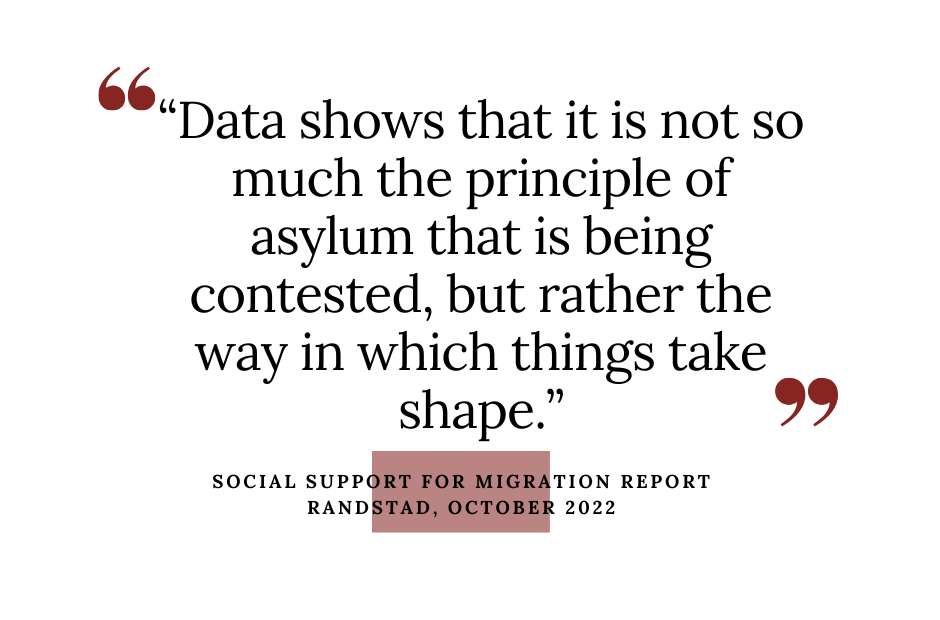A survey carried out by HR company Randstad Group Belgium has shown that Belgians have a generally negative attitude towards migration, with the "average" Belgian seeing migration as negative for Belgian society as a whole. However, their views become more positive towards those who migrate to Belgium for work.
In a survey of more than 3,000 respondents, 60% stated that migrants “cost more than they earn.” Only 18% believe that migration improves the Belgian economy; 64% believe that the quality of education has been brought down by migration.
The personal experiences of migration that they recounted were also rather negative. 58% feel less safe as a result of migration and 53% less safe at home. Almost twice the share of respondents had negative experiences of migration than those that had positive experiences.
It is perhaps not surprising that only 27% of respondents believe that migration has been beneficial to Belgium over the past 50 years. 39% explicitly stated that it has had a negative effect on the country, though a large chunk were undecided.
Belgians less opposed to migrant workers
Belgians appear to be most opposed to migration in the context of social security and social assistance; when migrants fill vacant working positions, much of the anti-immigrant sentiment disappears.
In many sectors of Belgium's economy, there are critical shortages of employees for job listings. Brussels has over 100 professions that are in short supply, mostly in construction, IT, education, and personal care.
60% of respondents were supportive of migrants that help with labour shortages whereas only 12% opposed this. 15% endorsed the complete closure of Belgium’s borders.
Asylum seekers and family reunification
Belgians also appear to be widely compassionate towards migrants bringing their families to Belgium. Only 16% were against migration for the sake of family reunification, mostly those who also advocated for the closure of Belgium’s borders.
Nevertheless, a large majority (72%) think there should be strict conditions for this migration, such as compulsory integration, language skills, and a minimum four-year working period before inviting family members.
Likewise, the survey suggests that Belgium is generally sympathetic to the plight of asylum seekers. Belgium has long been a preferred destination for asylum seekers but has struggled to properly accommodate those who travel to Belgium.
Many asylum seekers have been forced onto the streets due to a lengthy asylum procedure and insufficient places. 61% of Belgians agreed that those who apply for asylum in Belgium and are entitled to it should be able to remain and receive protection. Only 17% disagreed.
All the same, Belgians still want stricter conditions for asylum. Only 23% stated that there should be no maximum capacity for asylum seekers. Only 14% want a limit on asylum seekers from Europe, demonstrating a clear, if not particularly strong, European bias.
By December, Belgium's Defence Ministry intends to create another 1,500 places to accommodate asylum seekers.
Belgium's reception crisis explained
For more than a year now, hundreds of asylum seekers have been sleeping rough as a result of Belgium's failure to provide them with the shelter they are legally entitled to.
Fedasil, Belgium's Federal Asylum agency, operates several reception centres across Belgium (of which Petit Château in Brussels has become the most notorious), where people who have been granted asylum in the country should receive a bed, bath and food (or a sheltered place).
Once the rush of asylum seekers coming to the country temporarily slowed down following the migration crisis, the government reduced the number of sheltered places, closing down Fedasil centres.
Since October last year, this figure is once again increased slowly, and the government is not responding to the rise in demand for sheltered places.
Instead, it created a waiting list which prioritised minors and families with children, leaving single men to sleep on the streets, and resulting in Fedasil being convicted more than 4,500 times for failing to provide shelter.
55% of respondents believe that the “temporary” nature of asylum should be reinforced by the Federal Government. When the situation in their country of origin is safe again, most believe that these asylum seekers should return home.
61% of respondents believe that countries that do not take back asylum seekers should receive some form of penalty. Worryingly, 43% stated that Belgium’s asylum system should be “abolished” because it is not currently possible to deport asylum seekers whose applications are rejected.
Is Belgium a soft touch?
Overall, the study reveals a general desire for Belgium to adopt a stricter approach to migration – especially illegal migration. "Sans papiers" (undocumented migrants who enter the country) have repeatedly protested their lack of status within Belgium, often going on hunger strike or occupying public buildings in Brussels.
An open border policy, whereby illegal migration ceases to exist, is unpopular and received the backing of just 16% of those surveyed. There was broad support for a joint approach to illegal migration, both in Belgium and on an EU level.
The majority of Belgians (56%) believe in punishment for those entering the country illegally. This anti-immigration sentiment is not exclusive to Belgian right-wing. There is significant support for tougher migration control even within traditionally left-wing parties.
Related News
- Green leader calls for undocumented migrants to fill staff shortages
- Belgium's employment paradox: Need for lower-paying jobs and flexible workers
Only around half of the green electorate believes that migration has had a positive impact on Belgium over the last 50 years. Political alignment still had the biggest influence on attitudes towards migration.
“Views on migration are highly politicised, with proponents and opponents of a firm approach concentrated in a limited number of parties,” Randstad noted.
Flemish centrist party CD&V, Les Engagés, and Open VLD voters are most sympathetic towards migration for work. Flemish nationalists Vlaams Belang are negative towards migration in almost all categories. Interestingly, communist and socialist voters (PVDA and PS) are as opposed to migrant workers as their nationalist opponents.
Intriguing dynamics
While the N-VA and Vlaams Belang are generally considered as political allies, their attitudes to migration can vary greatly. For example, 69% of the N-VA electorate is pro-migration when it addresses labour shortages – much more than the global average of 60%.
Even between the regions, sister parties have differing views on migration. For example, 30% of the French-speaking Ecolo electorate is in favour of open borders, and 35% against. For the Flemish Groens, it is 29% and 27% respectively.
Closed borders, an official policy position of Vlaams Belang, is only endorsed by 30% of its electorate, while 35% are opposed. Likewise, 21% of Belgium’s communist PTB/PVDA voters supported closed borders (well above the national average), while at the same time 28% were in favour of open borders.
When taking gender, age, and education into account, some expected outcomes can be observed. Women, those who are highly educated, young people, and French speakers tend to be more positive towards migrations. Those with more pessimistic outlooks on the future, both in terms of social and personal progress, are more likely to oppose migration.
Highlighting work
Despite a large sample size and cross-section of Belgian society, the researchers did acknowledge an underrepresentation of respondents from "non-western" backgrounds.
Nevertheless, the results raise questions about Belgium’s approach to immigration policy as well as how migration is perceived. The statistics suggest that Belgians are not opposed to the concept of migration itself, but rather how it has played out in the last 50 years.
The researchers called attention to the apparent support for a stricter stance on migration and stated that the "relationship with work should be strengthened."


